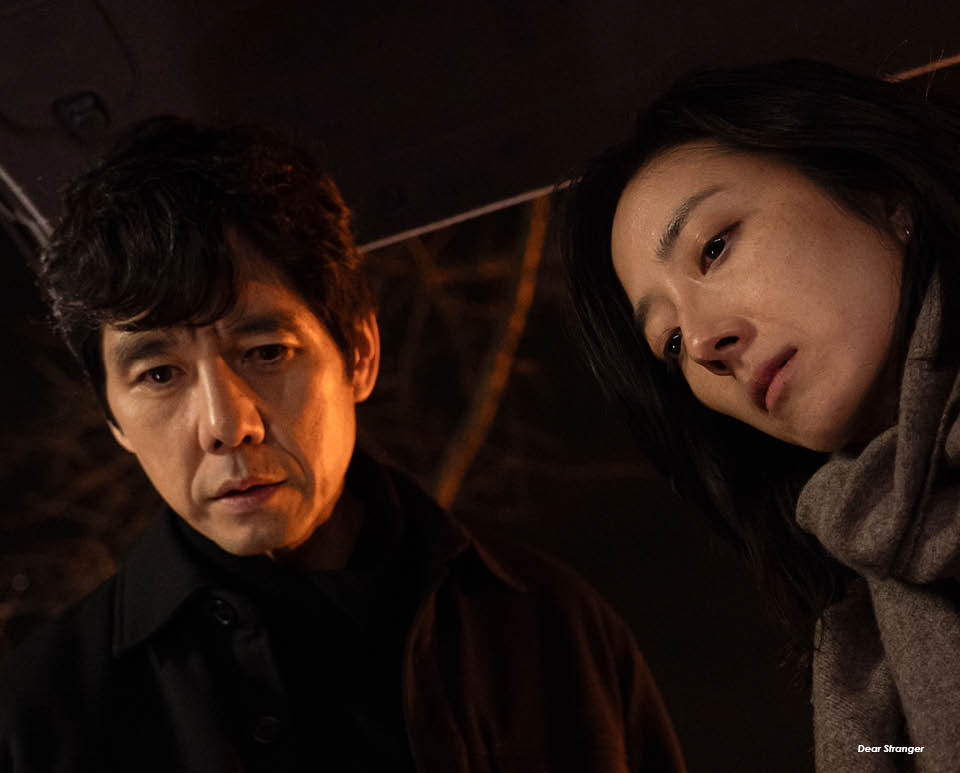
Dear Stranger adds film festival acclaim to Taiwanese telco Far EasTone Telecom’s content investment portfolio. Gary Tsai, COO – Digital Entertainment, friDay Video/Far EasTone Telecom, spoke to Janine Stein about what drives content investment decisions; Susan Hornik talked to the film’s writer/director Tetsuya Mariko.
Tetsuya Mariko’s suspense drama, Dear Stranger, is a poster project for Taiwan’s latest era of international outreach. Part of Taipei-based telco giant Far EasTone’s content investment portfolio, the English-language film opened in Japan in mid-September and premiered internationally at the Busan International Film Festival (BIFF) a few weeks later.
Produced by Roji Films, Dear Stranger follows Far EasTone’s backing for Michihito Fujii’s 18x2 Beyond Youthful Days (2024), which was distributed in more than 10 countries as well globally on Netflix.
Gary Tsai, COO – Digital Entertainment, friDay Video/Far EasTone Telecom, says the main reason behind the decision about two years ago to invest in Dear Stranger was similar to 18x2 – a solid story backed by a strong team.
“We started with a very good story and with a very driven and persistent director and writer,” Tsai told delegates at the ContentAsia Summit in Taiwan in early September ahead of the film’s release.
Tsai calls Dear Stranger a true co-production, with skills, financial backing and filming spread between three countries/partners. The film was shot in New York and post-production was done in Taiwan.
Dear Stranger follows a mixed Japanese/Chinese couple – an assistant professor of architecture played by Hidetoshi Nishijima (Drive My Car) and puppeteer Gwei Lun-Mei (Black Coal, Thin Ice). When their young son goes missing, they are forced to confront unspoken truths and the fragile bonds of family.
Notes issued before the film’s release quote Mariko as saying violence often appeared in physical and graphic forms in his earlier works.
“With Dear Stranger, I wanted to explore a different kind of violence – the silence, distance and unspoken cruelty that emerge inside intimate relationships. This ‘cold violence’ may not draw blood, but it leaves deep scars and erodes...
Dear Stranger adds film festival acclaim to Taiwanese telco Far EasTone Telecom’s content investment portfolio. Gary Tsai, COO – Digital Entertainment, friDay Video/Far EasTone Telecom, spoke to Janine Stein about what drives content investment decisions; Susan Hornik talked to the film’s writer/director Tetsuya Mariko.
Tetsuya Mariko’s suspense drama, Dear Stranger, is a poster project for Taiwan’s latest era of international outreach. Part of Taipei-based telco giant Far EasTone’s content investment portfolio, the English-language film opened in Japan in mid-September and premiered internationally at the Busan International Film Festival (BIFF) a few weeks later.
Produced by Roji Films, Dear Stranger follows Far EasTone’s backing for Michihito Fujii’s 18x2 Beyond Youthful Days (2024), which was distributed in more than 10 countries as well globally on Netflix.
Gary Tsai, COO – Digital Entertainment, friDay Video/Far EasTone Telecom, says the main reason behind the decision about two years ago to invest in Dear Stranger was similar to 18x2 – a solid story backed by a strong team.
“We started with a very good story and with a very driven and persistent director and writer,” Tsai told delegates at the ContentAsia Summit in Taiwan in early September ahead of the film’s release.
Tsai calls Dear Stranger a true co-production, with skills, financial backing and filming spread between three countries/partners. The film was shot in New York and post-production was done in Taiwan.
Dear Stranger follows a mixed Japanese/Chinese couple – an assistant professor of architecture played by Hidetoshi Nishijima (Drive My Car) and puppeteer Gwei Lun-Mei (Black Coal, Thin Ice). When their young son goes missing, they are forced to confront unspoken truths and the fragile bonds of family.
Notes issued before the film’s release quote Mariko as saying violence often appeared in physical and graphic forms in his earlier works.
“With Dear Stranger, I wanted to explore a different kind of violence – the silence, distance and unspoken cruelty that emerge inside intimate relationships. This ‘cold violence’ may not draw blood, but it leaves deep scars and erodes the foundations of marriage and trust, like ruins quietly collapsing from within,” he says.
If the investment decision for Far EasTone appears to have been relatively straightforward, Mariko describes Dear Stranger as an “immense challenge for me”, including language and cultural barriers.
In addition, this was his first time shooting abroad after making several films in Japan, he tells ContentAsia. “The use of multiple languages and the filmmaking process itself are very different in Japan and America, so I had to return to the basics, working through trial and error to complete the film,” he says.
Mariko says he “wrote down as many visual ideas as possible and prepared shot lists to aid communication. Building in time for this preparation was essential.” He believes the team approached the filmmaking with even more care than in Japan.
“Most importantly, the staff who gathered for the project worked hard to understand one another, and thanks to that, we were able to make the film without major obstacles,” he says.
The veteran writer/director drew from his own life when writing the script. “From 2019 to 2020, I lived in the U.S. with my family. The many experiences I had there had a huge impact on me as a writer. On the flight back to Japan, I was thinking of setting my next film in America – when suddenly, a national emergency was declared in the U.S. and the world completely changed.”
He kept in touch with friends living in America and asked them to send him video footage of family dinners from around the world. “Out of that process, I began focusing on family relationships – the smallest unit of society – and started writing the script,” he says.
Mariko describes his latest project as a “step forward” from his past works – the violent Destruction Babies (2016) and romance From Miyamoto to You (2019).
“In my work so far, I have often confronted violence,” he says. “Destruction Babies depicted the almost catastrophic absurdity of young men fighting each other with an animalistic drive, and the society around them. Miyamoto portrayed the disasters that befall a young couple and how they struggle to live on.”
For Dear Stranger, Mariko turned his focus to an Asian family, examining how they “face and survive” the hardships that strike them.
“This film has become very important for me in thinking about what I will make in the future… I’ve been influenced by the many films I’ve seen, the ideas I’ve encountered, and the books I’ve read, I feel my cinematic world is gradually expanding. Above all, the question is: how do we face this complicated society? I try to keep my feet firmly on the ground, continue making films, and keep challenging myself.”
Mariko was able to navigate identity and belonging/connecting across borders and languages without falling into stereotypical tropes.
“In America, I myself was the ‘stranger’,” he says. “That is precisely why I tried to talk with local people and understand them. I could never do the same things they do, but I believed there was something that only I could do. With that in mind, I kept experimenting as I wrote the script.”
During his time in the U.S., Mariko became more aware of the ambiguity of identity and the difficulty of integrating into new communities.
“The film also reflects this condition: how words fail, how communication across languages falters, and how silence takes on its own meaning in intercultural encounters,” he says.
Dear Stranger was shot entirely on location in New York City, which Mariko calls a “stimulating city where many cultures mix”.
“Simply living there is economically demanding, and the fact that Kenji and Jane are raising their family amid that whirlwind is directly connected to the stresses they face... Just balancing that is already a tremendous challenge. The fact that they live in New York is deeply tied to who they are as characters – it plays an essential role in the story.”
Mariko hopes audiences will “watch this story as if it were their own”.
“Even while I was writing the script, there were many different opinions, and I found that very interesting – within the same family, each person has their own way of thinking, and they must respect one another… I believe everyone who sees the film will have something to think about from their own perspective. If people continue conversations after watching, the film will gain even more depth.”































